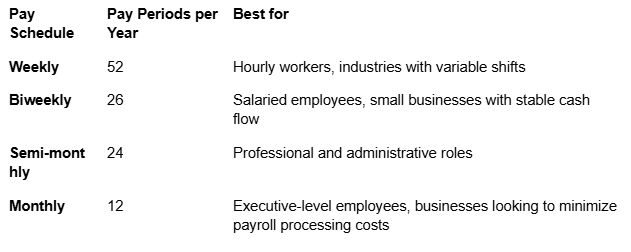What is weekly pay?
Weekly pay is a payroll schedule where employees receive wages once per week, usually on the same day (e.g., every Friday). This results in 52 pay periods per year and is commonly used in industries where employees rely on frequent paychecks, such as hospitality, retail, and construction.
How does weekly pay work?
Small businesses that use a weekly pay schedule run payroll once every week. With a weekly pay schedule:
- Employees receive a weekly paycheck for hours worked during the prior pay period.
- Payroll taxes and deductions are processed with each paycheck.
- Overtime is calculated based on a 40-hour workweek.
- Employers must ensure they have sufficient cash flow to cover payroll weekly.
Comparing weekly pay with other pay schedules
Employers often compare weekly pay with other payroll structures to determine the best pay periods to fit their business:

The pros and cons of weekly pay
There are positives and negatives to using a weekly pay period, and you should consider these carefully to decide whether weekly pay is best for your business compared with biweekly payroll or other pay periods.
Pros for employers:
- Attracts hourly workers: Employees prefer frequent paychecks.
- Simplifies overtime calculations: Overtime is calculated based on a weekly schedule.
- Reduces payroll disputes: Employees receive quicker pay, leading to fewer wage disputes.
Cons for employers:
- Increases payroll processing costs: Running payroll weekly can be more expensive.
- Requires strong cash flow management: Businesses must ensure they have enough funds for weekly payroll.
- More administrative work: Payroll staff must process payments more frequently.
How weekly pay affects payroll taxes
Employers must account for payroll tax withholdings with each weekly paycheck:
- Federal and state income taxes are deducted every week.
- Payroll deductions (e.g., health insurance, 401(k)) are spread across 52 paychecks.
- Overtime calculations are processed every pay cycle, making payroll tracking more frequent.
Using payroll software can help your business keep up with automatic tax calculations and payroll processing, which reduces errors and compliance risks.
How Homebase helps manage weekly payroll
Managing weekly payroll manually can be time-consuming, but Homebase payroll makes it easier by:
- Automating payroll processing for hourly and salaried employees
- Tracking employee hours and overtime calculations
- Ensuring payroll taxes and deductions are applied correctly
- Processing direct deposits on time to ensure consistent payments for employees
Get started with Homebase to simplify your payroll and keep weekly pay processing running smoothly.
